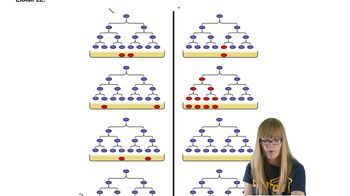Table of contents
- 1. Introduction to Genetics51m
- 2. Mendel's Laws of Inheritance3h 37m
- 3. Extensions to Mendelian Inheritance2h 41m
- 4. Genetic Mapping and Linkage2h 28m
- 5. Genetics of Bacteria and Viruses1h 21m
- 6. Chromosomal Variation1h 48m
- 7. DNA and Chromosome Structure56m
- 8. DNA Replication1h 10m
- 9. Mitosis and Meiosis1h 34m
- 10. Transcription1h 0m
- 11. Translation58m
- 12. Gene Regulation in Prokaryotes1h 19m
- 13. Gene Regulation in Eukaryotes44m
- 14. Genetic Control of Development44m
- 15. Genomes and Genomics1h 50m
- 16. Transposable Elements47m
- 17. Mutation, Repair, and Recombination1h 6m
- 18. Molecular Genetic Tools19m
- 19. Cancer Genetics29m
- 20. Quantitative Genetics1h 26m
- 21. Population Genetics50m
- 22. Evolutionary Genetics29m
17. Mutation, Repair, and Recombination
Spontaneous Mutations
Problem 15
Textbook Question
Textbook QuestionThe family of a sixth-grade boy in Palo Alto, California, was informed by school administrators that he would have to transfer out of his middle school because they believed his mutation of the CFTR gene, which does not produce any symptoms associated with cystic fibrosis, posed a risk to other students at the school who have cystic fibrosis. After missing 11 days of school, a settlement was reached to have the boy return to school. What ethical problems might you associate with this example?
 Verified Solution
Verified SolutionThis video solution was recommended by our tutors as helpful for the problem above
Video duration:
54sPlay a video:
Was this helpful?
Video transcript

 9:52m
9:52mWatch next
Master Spontaneous Mutations with a bite sized video explanation from Kylia Goodner
Start learningRelated Videos
Related Practice


